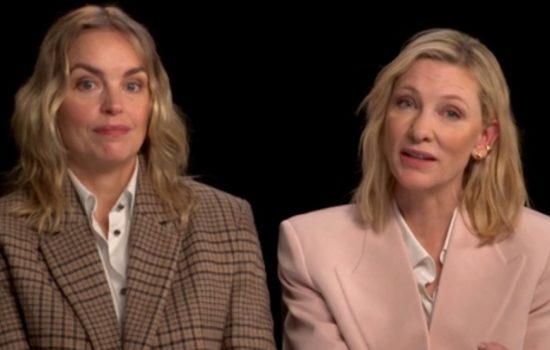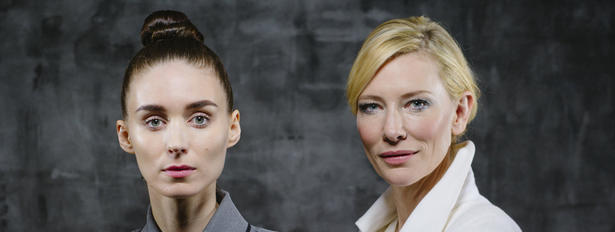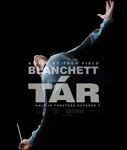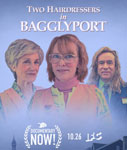Hey Everyone!
New promotional interview with Cate Blanchett for SK II. Enjoy the reading!
When you find yourself in the presence of Cate Blanchett what do you talk about? This isn’t a trick question. The actress has accolades by the dozen, is a devoted mother of four, and is a staunch advocate for women. Truly, where do you start?
Luckily, I’m with catching up with her for an SK-II press junket, so skin care and unrealistic standards about aging make natural entry points for discussion. The brand is celebrating its limited-edition Mother’s Day essence, a gift, I’ve got to say, is hard to hand over. I already have three different versions of the treatment. It’s light and refreshing—a joy to spritz and pat on, and if using it at every opportunity means I’ll have skin as radiant as Blanchett’s in 13 years (which is as long as she’s been the brand’s spokeswoman), I’ll happily hoard this bottle too. (Sorry, Mom.)
Here, the Broadway sensation talks masking, motherhood, and the importance of making time for yourself. Even if that’s only long enough to moisturize.
First off, I’ve just got to say your skin is phenomenal. What’s your current routine?
It changes depending on whether I’m just running around in everyday life or whether I’m on stage. Because obviously doing eight shows a week [on Broadway], I‘m taking my makeup on and off three times a night, eight times a week. So my cleansing regimen changes. On those nights, I use an oil cleanser because it gently removes all your eye makeup well. And then any other time, I use the SK-II LXP range morning and night: the facial treatment essence, the eye cream, the serum, and the moisturizer. For nearly an entire decade, I was decanting the essence into a spray bottle, and then I finally talked SK-II into doing a mist, which I now use day and night. And then, say today before an event, I put a mask on.
What kind of masks are your favorite?
I love to do a brightening mask [before appearances], because it evens out your skin tone and it helps to luminize it. It gives your skin more radiance. For a big event like a red carpet, I might do a treatment mask [to moisturize] the day before and then do a brightening mask while getting ready. And when I’m traveling, I’ll do a facial treatment mask because it’s really hydrating.
You have three sons, and you recently adopted a daughter. How has she changed the way you view societal pressures on women?
I think women are in a very challenging place at the moment. And the challenge is to band together no matter what your socioeconomic standing is. We’re all female humans. I’ve felt that way raising sons too. Because as a mother of sons you have a responsibility to instill in them the need to and the benefits of respecting women. That hasn’t changed. But what’s never been more important is the necessity to impart in young girls a sense of self-respect, a sense of having expectations, and a right to achieving quality. And of course having a young daughter now, one becomes more acute on a daily basis. I wake up to a reminder of that responsibility to lead by example.
What ways are you trying to make your daughter’s experience different from yours?
I grew up with a mother who was big on self-respect and sent me to attend a very feminist school. So much so, that we weren’t doing school plays with boys because [they] felt that plays always skewed to favoring roles for them. We had to invent our own drama. And I’m sure that’s where my love of drama was born and nurtured. My mom was very much about being self-directive as a woman and not finding your identity in who you were with.
What’s also important—and not to generalize—but women are great community builders. We have to recognize our right to self-expression and our right to discover and grow our individual identities. And yet, also at this moment, I think it’s important to remember our collective identity. It’s been a long time now since universal suffrage. Equal pay for equal work sounded like an odd conversation last year, and now it seems like an impossible conversation. Around the world, there are countries reducing the legal age where the girls can enter into marriage. Even in this country, there are states where girls can get married at the age of 14. And, talking about reproductive rights, we’ve lost a lot of ground. We’re only going to get that ground back and move forward if we act collectively. It’s a two-prong thing: it’s enshrining our ability to be individuals, but also to work together.
To that point, self-care has become a big buzzword lately—and it’s even harder to do when you have others you care for. Did you find it more difficult to take care of yourself when you became a mom?
Absolutely. When anything momentous happens in your life—if you take a big career turn, or you fall in love for the first time, or you have a child, adopt a child, even when you turn a certain age—it often takes a while to recalibrate and work it out. You realize, “I don’t have two legs anymore; I have four legs.” A lot of things went out the window for me for awhile. Looking after yourself is usually the first thing to go. But then I quickly realized if you’re incapable of looking after yourself, you’re incapable of looking after other people. It’s about trying to find as much as you can of a balance. I mean, life is constantly out of balance. I haven’t found a balance.
Totally. I think work-life balance is a myth.
It is a myth! Life is chaos. And that’s why taking literally three minutes for myself in the morning and at night—to put on two sets of moisturizers and a serum—sounds really small, but it certainly became an indispensable life raft. Now, I’m like, “I’m taking these three minutes, and I’m not leaving the house until I’ve done it.” You wouldn’t go out of the house without brushing your teeth, right? I do often go out of the house without brushing my hair. Something’s got to go! But I’ll always have moisturizer and sunscreen on—and underpants.
You mentioned earlier about there being societal pressure “even when you turn a certain age.” At what time in your life did you stop feeding into those unrealistic expectations?
I think there’s far more pressure on women than there is on men. The fact that we’re having this very conservation is proof. I think, like anybody, you have good days, and you have bad days. It doesn’t really have a rhyme or a reason. The media often says [that] when you hit 40 or 50, or whatever the milestone is, you have to prepare yourself for it. I think we all grow in very random, personal ways. So anything you have to do to make yourself feel better or more confident, whether it’s looking after your skin, getting a massage, going to the gym, or sleeping—anything!—you should do it.
We often talk about quick beauty fixes, but sometimes you just need to sit down and turn your phone off for 20 minutes, and that’s all you need to make your face relax. People think you look so much better, and it’s just because you’ve gotten rid of the stress. It’s hard, particularly at the moment. I think there’s a lot of fear and anxiety being cultivated by our various governments around the world. It’s increased people’s stress loads. Give up social media. That’ll take 10 years off you.
Do you think the way we discuss aging and self-care has evolved?
I grew up in a house with three generations of women. I was brought up by my mother and my grandmother in the same house. So I’ve grown up around people older than me. I think as a society, we need to banish the notion of “old age.” We don’t get to know and cohabit and mingle with people who are several generations ahead of us. And as a result, we’ve become more fearful of aging. And you know, how funny my mom and my grandmother were, how active they were, [it was inspiring]. I used to love hearing the stories from when they were girls. So it’s never been a fearful space for me. I mean, no one wants to die. But we’re all heading in that direction, and it’s really helped me move through knowing that there are more interesting things to come.
And, look, I’m very privileged. I’m financially secure. I have healthy children. I’ve been blessed in a lot of ways, so it’s very easy for me to say that [I’m comfortable]. And you know, it wasn’t always that way for me. It certainly wasn’t for my mother or my grandmother. But growing up alongside them was really formative.
What were their viewpoints on aging? Did they ever give you advice?
My grandmother had a few regrets, I think. [Her big lesson to me] was don’t leave life regretting not having done something. Don’t say, “I wish I had done that.” Just go and try and do it. But on a practical level, my mother was very big on protection and moisturizing—taking care of herself the best she could then. She had limited means, but she still took care of herself. She didn’t expose herself to the sun. And that’s something that was passed down to me, which I’m really grateful for.
And before we go, what are you looking forward to most this Mother’s Day?
I’m looking forward to having no plans whatsoever. Just an open horizon for the whole day. That’s my idea of bliss.
This interview has been edited and condensed.
via Glamour
 Welcome to Cate Blanchett Fan, your prime resource for all things Cate Blanchett. Here you'll find all the latest news, pictures and information. You may know the Academy Award Winner from movies such as Elizabeth, Blue Jasmine, Carol, The Aviator, Lord of The Rings, Thor: Ragnarok, among many others. We hope you enjoy your stay and have fun!
Welcome to Cate Blanchett Fan, your prime resource for all things Cate Blanchett. Here you'll find all the latest news, pictures and information. You may know the Academy Award Winner from movies such as Elizabeth, Blue Jasmine, Carol, The Aviator, Lord of The Rings, Thor: Ragnarok, among many others. We hope you enjoy your stay and have fun! 



 Black Bag (202?)
Black Bag (202?) Father Mother Brother Sister (202?)
Father Mother Brother Sister (202?) Rumours (2024)
Rumours (2024) Borderlands (202?)
Borderlands (202?) The New Boy (2023)
The New Boy (2023) TÁR (2022)
TÁR (2022) Guillermo Del Toro’s Pinocchio (2022)
Guillermo Del Toro’s Pinocchio (2022) Documentary Now!: Two Hairdressers in Bagglyport (2022)
Documentary Now!: Two Hairdressers in Bagglyport (2022) The School for Good and Evil (2022)
The School for Good and Evil (2022)












